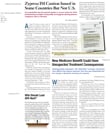Anewly identified genetic mutation appears to be associated with Alzheimer's disease. A variation in UBQLN1, a gene that encodes the protein ubiquilin 1, substantially increases the risk of Alzheimer's disease, according to Lars Bertram, M.D., and colleagues at the MassGeneral Institute for Neurodegenerative Disease in Charlestown, Mass. They reported their findings in the March 3 New England Journal of Medicine.
The UBQLN1 gene is located on chromosome 9q22. The researchers evaluated 19 single-nucleotide polymorphisms in three genes within the chromosome 9q linkage region in 437 families with Alzheimer's disease in a sample from the National Institute of Mental Health (NIMH). Those polymorphisms that showed a positive result were then tested in a second sample of 217 siblings discordant for Alzheimer's disease (224 affected subjects and 265 unaffected subjects) from the Consortium on Alzheimer's Genetics (CAG).
Finally, the researchers assessed the functional effect of an implicated single-nucleotide polymorphism in brain tissue from 25 patients with Alzheimer's disease and 17 controls. They found a significant association between Alzheimer's disease and various single-nucleotide polymorphisms in UBQLN1 in the NIMH sample, which were then confirmed in the CAG sample. A single risk-conferring mutation was identified on a specific segment of the chromosome, and that mutation was then found to be associated with a dose-dependent increase of the protein ubiquilin 1 in the brain samples of patients with Alzheimer's.
Previously identified mutations in three genes are associated with relatively rare, early-onset Alzheimer's (APP, PSen1, and PSen2); a mutation in one gene, ApoE4, has been associated with the more common late-onset Alzheimer's.
But these four genes are believed to account for less than half the genetic variance in all Alzheimer's disease cases. Thus, the discovery, if it can be replicated, of a fourth candidate gene is significant.
In an editorial accompanying the article, neurologist and Alzheimer's expert Thomas Bird, M.D., called the identification of UBQLN1“ intriguing,” noting that the finding requires replication.
“It is estimated that there are at least two or three (and possibly five or six) additional genes influencing the age at onset and the risk of the disease,” Bird wrote. “Genetic linkage analysis and similar studies involving hundreds of families have produced evidence for a number of chromosomal regions suspected of harboring genes related to Alzheimer's disease.... So far, careful scrutiny of these regions has not resulted in the identification of an unequivocal `Alzheimer's disease gene.' More than 100 genes have been implicated through genetic-association studies, but none of these findings has been fully replicated. The hunt continues, driven by the need to better understand the pathogenesis of the disease and improve diagnosis, treatment, and prevention.”
N Engl J Med 2005 352 884
